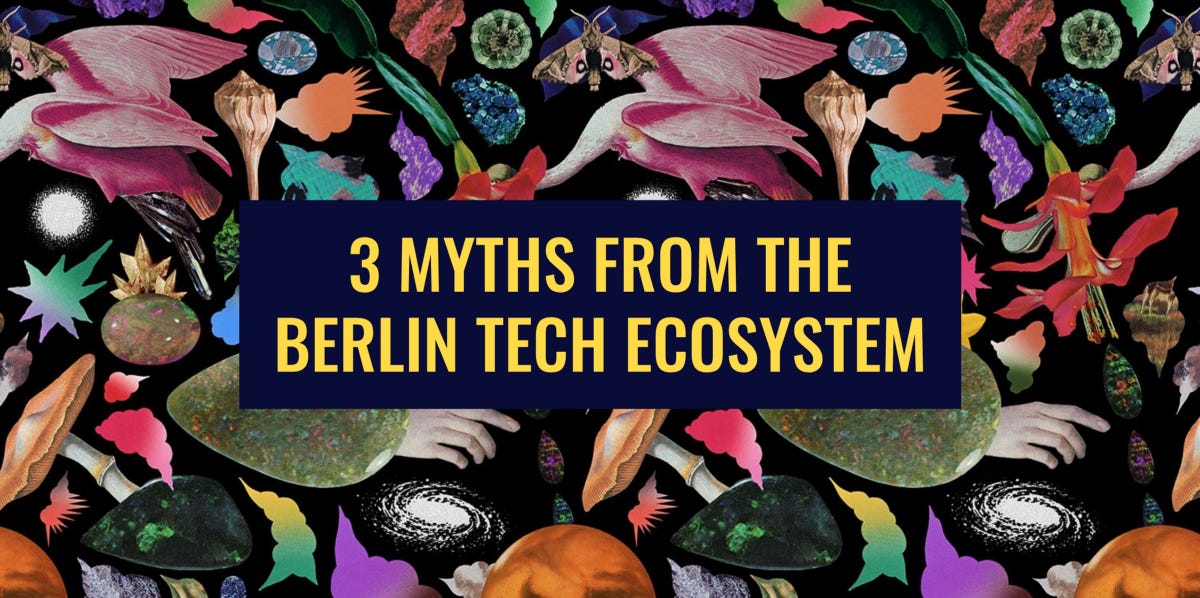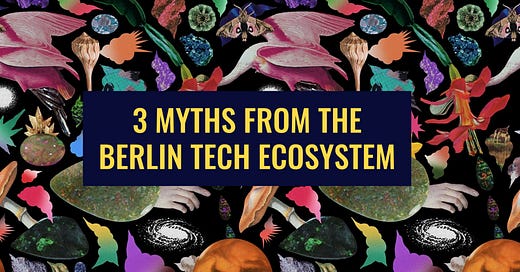3 Myths from the Berlin Tech Ecosystem

The stories you hear about Berlin today are like the light from distant stars: they’re coming from the past. Most people still believe you can find 200 m2 apartments for less than €1k/month, pay engineers less than a Community Manager in San Francisco & burn money like it’s 2012 at Rocket! 🚀
These have become tech hub myths in 2018 Berlin, and they are worth debunking. Let’s see what we’ve got…
Myth #1: It’s cheap 💸
“Berlin is SO cheap! You live like a king for €500 a month!”
Cost of living: A few years ago, coming to Berlin as an early-stage startup to lower burn-rate was a real strategy. Housing prices then went up 100% in 10 years but, sure, you can still probably burn 30–50% less than you would in Paris or London. Still, if being cheap is your #1 priority, you’ll now find cheaper options in Spain or CEE.
Office Space: If you’re starting to grow, it gets even tougher. Finding decent office space is a real struggle, as prices have tripled since 2014 and only 2% of the supply is available on any given day. That won’t be getting better either, since the classic lease period is ~5 years, the demand is high and growing, and good offices spaces are snatched up after ~1/2 months on the market.
Talent: Berlin is a buffer between Eastern Europe and Western Europe, so there’s a good amount of software developers from Poland, Ukraine, Bulgaria, Belarus, etc. But don’t think of them as a cheap labor force, they’re not. If you’re planning to hire in Berlin, look at the average salary for new hires, not at the current average salary. Today, Paris and Berlin are not that different salary-wise, take a look.
Myth #2: It’s creative 💥
“Berlin is SUCH a creative city! Art everywhere, people are free to create anything!”
Rocket DNA: Rocket Internet made the Berlin tech scene, period. I’ll sum up Berlin’s tech history in an upcoming post, it really is fascinating! Obviously things have changed since 2008. But even if the copycat days are over, that DNA has stuck. Rocket’s had kids, nieces and nephews, grandkids. As a matter of fact, all 4 other members of the Berlin Unicorn Club (Auto1, Zalando, HelloFresh, Delivery Hero & not this one) were started by Rocket or Rocket alumni. Berlin is more of a scaling factory than a creator’s workshop.
The Soundcloud Generation: For some time, people associated Berlin’s hype with Soundcloud, believing that the cool Berlin unicorn could foster a new generation of creative entrepreneurs. But even if there are a few amazing consumer product teams in Berlin (like Jodel, Wavy or Blinkist), great creative product founders are still a rare species in the city, and they usually hang out together! 🍻
No crossover: Berlin has lots of DJs, artists, a vibrant underground culture. Blended with the tech world, you’d think it would create lots of amazing interdisciplinary mixes! Nope. The startup & underground culture don’t connect. At all. They even tend to deeply avoid each other, except on Sunday mornings at Berghain, where they’re all on “Product Hunt”, but not this one. 😂
Myth #3: It’s a capital 👑
“Berlin is the capital of Europe’s strongest economy, it can’t be missed!”
Just one of Germany’s capitals: Every ambitious person in France or the UK will seriously consider respectively moving to Paris or London. Germany is different, ambition leads to multiple places. Berlin was “debundled” after the war: The car industry went to Stuttgart and Munich, press and insurance to Hamburg, finance to Frankfurt, etc. Lots of options, lots of clusters.
It’s a platform: Lots of VCs are based in Berlin but they don’t invest much in Berlin-based startups. Most Berlin-based accelerators are filled with startups from outside the city. People use the city as a platform to connect, influence & attract. Berlin bridges Eastern Europe, Western Europe, the Nordics & Israel (there are 50k Israelis in Berlin on any given day), a modern version of the Tower of Babel but where everybody has a shared protocol: English. Well, sauf les Français, ça va de soit.
And a magnet: Historical networks aren’t too deep — it’s basically Tech, Government and Parties. Additionally, it’s in the middle of East Germany, which is less crowded & less attractive. So Berlin had to become a magnet, constantly importing its talent as the German capital isn’t surrounded by lots of prestigious universities nor corporations, as opposed to London & Paris.
So why do people keep repeating the old myths? Mostly a combination of biases, clichés & fast-paced change. Plus, the most vocal cheerleaders for Berlin are often founders of later-stage startups and VCs trying to attract top talents to the city. They’re not gonna say “Winter is horrible, and being judged for jaywalking gets old real fast.” They’d rather let people keep believing in the Berlin of 10 years ago. But the problem is that today’s Berlin really does have lots to offer — it’s just not what most people think 😉
The Diaspora of the Ambitious 💪🏽
For us at The Family, Berlin combines 4 things that few other cities in the world have: (1) full-stack talent and a competitive fundraising market, (2) a reasonable cost of living, (3) a very open visa policy and (4) English as a common-language (good luck trying to move talents to Paris if they don’t speak French, hein…).
We’ve decided to also use Berlin as a platform to relocate the most ambitious founders coming from anywhere, looking for big markets and the opportunity to build iconic companies. In essence, we’re trying to create a home for founders who find themselves constrained by the markets they operate in.
By moving their companies to Europe, we want to help them take that next step toward building an empire, with Berlin as their capital.
This diaspora of the radical and ambitious has enormous potential. Mathias wrote an amazing article introducing the program we’re about to launch, you’ll love it 💖
And if you have any questions, please reach out (hugo@thefamily.co).



